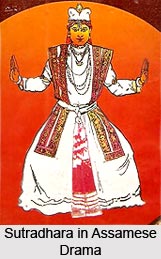 The literal meaning of sutradhara is `thread-holder`. This is a central character in Sanskrit theatre. He is analogous to a modern director, stage manager, and producer. Although the etymology suggests that he held the metaphorical thread. This runs through and holds together the various incidents in a play. Some scholars argue that the term originated in ancient art of puppetry in a very literal sense as `string-puller`.
The literal meaning of sutradhara is `thread-holder`. This is a central character in Sanskrit theatre. He is analogous to a modern director, stage manager, and producer. Although the etymology suggests that he held the metaphorical thread. This runs through and holds together the various incidents in a play. Some scholars argue that the term originated in ancient art of puppetry in a very literal sense as `string-puller`.
Bharata and Matrigupta, an early writer on dramaturgy, describe the sutradhard`s qualities. According to which he must be proficient in playing the various musical instruments. He should be an expert in theatrical speech, gaits, and movements of different characters, highly conversant with rasa and bhava. He should be skilful in the presentation of natya or theatre and other arts and crafts, learned in all the disciplines of knowledge, and capable of determining the rhythm and time measure to accompany various songs as well as comprehending the essence of prosody. He should himself be an excellent performer and, after understanding the play, must be able to impart the training to other performers as well.
The sutradhara occupied the central place on stage in the purvaranga rituals, rather like the Brahman of a Vedic sacrifice. Generally a caste Brahman himself, he was responsible for auspiciously conducting the purvaranga before the commencement of the show and delivering the prastaiana or prologue. He does this reciting the benedictory nandi stanza, and introducing the play. His rapport with the audience established, he announced and linked the action if such need arose during the performance itself, or to prevent the actors from straying and keep the production on the right track. In the play, he could impersonate a character, but also voiced aloud their inner thoughts or feelings whenever those were not revealed explicitly. He often intervened between scenes with meta-theatrical remarks about his actors or the action. This eternalized him as a character given spoken lines in many texts. At the end, he appeared again to deliver the bharatavakya i.e. `Bharata`s words`. This is the closing stanza of the text, a ritual valedictory blessing. Thus he held the centre of activities while keeping his presence in the background.
Later, he developed into various denominations as director, narrator, singer, reciter, or commentator in theatrical forms all over India. Especially for those presented in temples. In Yakshagana he became the bhagavata, in Rasalila the swami or samaji, in Ramlila the vyas, while in Dasavatar and Bhaona he remained the sutradhara.




















